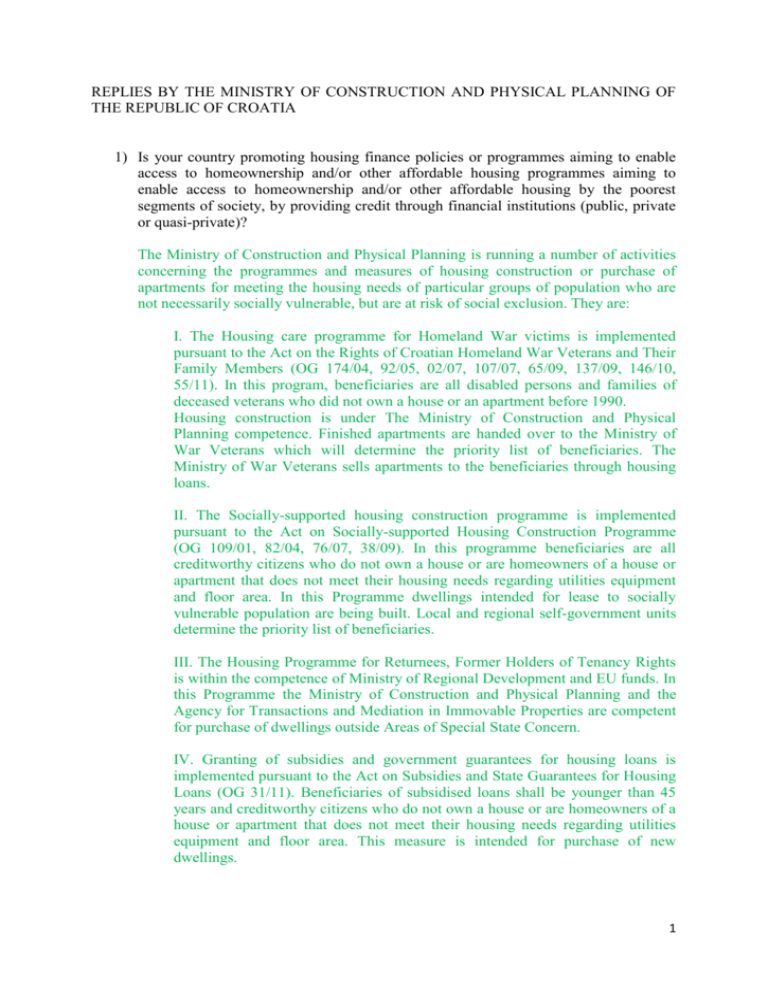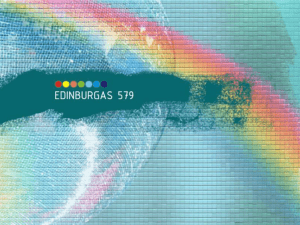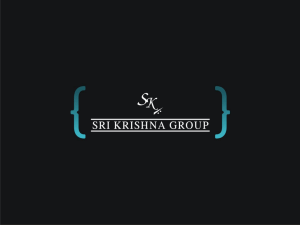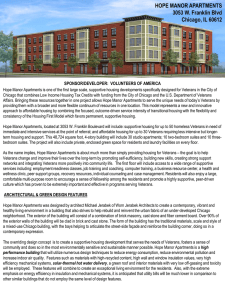97 68
advertisement

REPLIES BY THE MINISTRY OF CONSTRUCTION AND PHYSICAL PLANNING OF THE REPUBLIC OF CROATIA 1) Is your country promoting housing finance policies or programmes aiming to enable access to homeownership and/or other affordable housing programmes aiming to enable access to homeownership and/or other affordable housing by the poorest segments of society, by providing credit through financial institutions (public, private or quasi-private)? The Ministry of Construction and Physical Planning is running a number of activities concerning the programmes and measures of housing construction or purchase of apartments for meeting the housing needs of particular groups of population who are not necessarily socially vulnerable, but are at risk of social exclusion. They are: I. The Housing care programme for Homeland War victims is implemented pursuant to the Act on the Rights of Croatian Homeland War Veterans and Their Family Members (OG 174/04, 92/05, 02/07, 107/07, 65/09, 137/09, 146/10, 55/11). In this program, beneficiaries are all disabled persons and families of deceased veterans who did not own a house or an apartment before 1990. Housing construction is under The Ministry of Construction and Physical Planning competence. Finished apartments are handed over to the Ministry of War Veterans which will determine the priority list of beneficiaries. The Ministry of War Veterans sells apartments to the beneficiaries through housing loans. II. The Socially-supported housing construction programme is implemented pursuant to the Act on Socially-supported Housing Construction Programme (OG 109/01, 82/04, 76/07, 38/09). In this programme beneficiaries are all creditworthy citizens who do not own a house or are homeowners of a house or apartment that does not meet their housing needs regarding utilities equipment and floor area. In this Programme dwellings intended for lease to socially vulnerable population are being built. Local and regional self-government units determine the priority list of beneficiaries. III. The Housing Programme for Returnees, Former Holders of Tenancy Rights is within the competence of Ministry of Regional Development and EU funds. In this Programme the Ministry of Construction and Physical Planning and the Agency for Transactions and Mediation in Immovable Properties are competent for purchase of dwellings outside Areas of Special State Concern. IV. Granting of subsidies and government guarantees for housing loans is implemented pursuant to the Act on Subsidies and State Guarantees for Housing Loans (OG 31/11). Beneficiaries of subsidised loans shall be younger than 45 years and creditworthy citizens who do not own a house or are homeowners of a house or apartment that does not meet their housing needs regarding utilities equipment and floor area. This measure is intended for purchase of new dwellings. 1 V. Sale of apartments pursuant to the Act on Sale of Apartments with Tenancy Rights (OG 43/92, 69/92, 25/93, 26/93, 48/93, 2/94, 44/94, 47/94, 58/95, 11/96, 11/97, 68/98). Beneficiaries are holders of tenancy rights who lived in public apartments. VI. Sale of apartments pursuant to the Act on Sale of Apartments Intended for Janitors of Residential Buildings (OG 22/06). Beneficiaries are all janitors of buildings who have lived in public apartments. VII. Sale of apartments pursuant to the Decision on sale of apartments owned by the Republic of Croatia (OG 109/11) which are managed by the Ministry of the Interior, Ministry of Justice, Ministry of Regional Development and EU Funds, Agency for State Property Management. This measure is implemented by the Agency for State Property Management, and is intended for residents who are users of this apartments. VIII. Sale of apartments under the Decision on the sale of state-owned apartments managed by the Ministry of Defence (NN 116/11). This measure is implemented by the Ministry of Defence, and is intended for residents who are users of these apartments. By all the above mentioned Programmes and measures the state provided and facilitated the acquisition of ownership of the apartments. Meeting the housing needs of poorest segments of society (with minimal incomes and being not creditworthy) in the Republic of Croatia is provided by the Local and regional self-government units, and main sources of financing are Local and regional self-government units budgets. If the answer is positive: a. Please indicate whether these policies or programmes involve public subsidies, tax exemptions or other public financing ad I. The maximum price of construction of the apartment (the Model price) anticipated by this Programme amounts to € 772 / m2. The land and the utility equipping are financed and donated by local governments. Loan conditions are more favourable than on the market, and are defined by the Ministry of War Veterans. ad II. The state provides 25% of the Model construction price, and local governments finance utility equipping and the land for construction. The maximum price of the apartment is 140% of the Model price. ad IV. The beneficiary takes the loan for buying an apartment in the selected commercial bank. Using the funds from the State budget, half of the monthly 2 instalments are paid, in the first four years of loan repayment. The interest rate is restricted by law, under better conditions than commercial rates. The State also gives guarantees for the repayment of interest on due housing loan instalments instead of borrowers who remain unemployed and are not able to repay the loan to the commercial bank, however not longer than one year from the date of inability to repay the loan. ad V., VI., VII. By sale of apartments it has been made possible to acquire ownership of apartments under better conditions than the commercial ones. The price of the apartment is further reduced if the apartment is bought by bullet repayment, or if the apartment is in a smaller town, or is intended for families with more children, or is in an older building. - For apartments with tenancy right fixed interest rate of 1% was determined - For state-owned apartments the fixed rate is 4% - For apartments intended for janitors of a residential building the fixed rate is 2% b. Please indicate whether these policies or programmes involve the participation of one or more of the following international finance institutions: Internal financial institutions (World Bank Group, International Monetary Fund, etc.) Regional development banks (IDB, ADB (Asian), ADB (African), etc.) International private financial actors (commercial banks, investment funds, etc.) No, all financial resources are provided from the State budget and budgets of Local and regional self-government units. c. Please indicate the period of time during which these policies and programmes have been implemented ad I. from 1995 onwards ad. II from 2001 onwards ad IV. from 2011 onwards ad V. between 1991-2003 ad VI. during 2006 ad VII. from 2010 onwards d. Please indicate whether these programmes have been developed or implemented as part of recovery measures in the context of the global financial and economic crises that started in 2008. The Act on Subsidies and State Guarantees for Housing Loan was adopted in order to overcome the unfavourable conditions in housing construction, enabling to obtain favourable housing loans from commercial banks and to support citizens in case of sudden job loss. 3 2) Please provide any available assessment of the impact of such policies and programmes on the housing situation of the poor or other categories of beneficiaries Specifically, please provide the following data: a. The percentage of the population living in informal settlements before and after the implementation of these policies b. The percentage of households with access to improved sanitation (including in rural areas) before and after the implementation of these policies c. The percentage of population with access to electricity (including in rural areas) before and after the implementation of these policies d. The percentage of houses with ownership or clear title on their dwelling before and after the implementation of these policies From the beginning of the Housing care programme for Homeland War victims until the end of 2011 The Ministry of Construction and Physical Planning has built 6,073 apartments which is 84.4% of the total number of required dwellings. In the period 1991-2001 housing stock is increased by 85 005 housing units, and 2001-2011 by 262 873 housing units. Apartments in public housing sector construction are 2,11% of increase in housing stock for the period 2001-2011. Total residential construction conducted by the Ministry of Construction and Physical Planning makes this 3,3% increase in housing stock since 1991. 3) Please also provide information on programmes or policies concerning construction or provision of public housing for sale or rental in the country (including privatization of public housing). Please describe any significant reforms or developments in this sector over the last thirty years. Please provide (in annex) any relevant documents, laws, regulations or policies. The Housing care programme for Homeland War victims is implemented on the basis of data collected by the Ministry of War Veterans, which is responsible for determining the needs related to housing care for Homeland War victims. The Housing care programme for Homeland War victims includes organised construction of apartments and family houses with special adaptations for Homeland War veterans with 100% disability, the purchase of completed apartments or apartments completed to a high degree at new locations, adaptation of family houses for veterans with 100% disability, and renewal of existing buildings. The Programme for construction of apartments at new locations throughout the Republic of Croatia is implemented pursuant to the Act on the Rights of Croatian Homeland War Veterans and their Family Members (OG 174/04, 92/05). Local self-government units (cities and municipalities) are obliged to provide locations for housing construction equipped with municipal infrastructure, while organised construction is conducted by the Ministry of Construction and Physical Planning. By the end of 2011, under the Programme for construction a total of 6073 apartments at 315 locations was provided and handed over to the Ministry of War Veterans. Between 2004 – 2008, on the basis of Decisions of the 4 Government of the Republic of Croatia, public call procedures for purchase of apartments on the market were carried out and a total of 619 apartments at 77 locations were purchased in accordance with the priorities set by the Ministry of War Veterans. By handing over the last 184th family house in April 2008, the Ministry of Construction and Physical Planning concluded the Programme for construction of family houses with special adaptations for Homeland War veterans with 100% disability. Pursuant to the provisions of the Act on Socially-Supported Housing Construction Programme (Official Gazette 109/01, 82/04, 76/07, 38/09), Local self-government units establish, on the basis of a survey, priority lists and on the basis of identified housing needs in a particular area the construction of apartments is initiated. Local self-government units provide plots and cover the costs of equipping the plots with municipal infrastructure, and the Republic of Croatia ensures funds for construction costs in the amount of 25% of Model construction price per square metre of usable floor area of the apartment. The Model construction price is determined once a year by the Minister of Construction, and the construction price means all expenses related to construction (design, construction, supervision, etc.), including the value added tax. The Act on Amendments to the Act on Socially-Supported Housing Construction Programme (OG 82/04) provides for a possibility to stimulate, by public funds, construction and reconstruction (enlargement and extension) of buildings and family houses to ensure new residential space for natural persons in the prescribed standard, size and price for apartments under provisions of the Act, in a manner that the Republic of Croatia ensures funding for covering costs related to construction, i.e. 25% of the Model construction price. To realise this right a person needs to be on the priority list of Local self-government units, needs to hold the proof of ownership, or proof that he has a right to build, an act on the basis of which building is allowed, and a contract concluded with a contractor who is registered for carrying out construction activities. The Ministry of Construction and Physical Planning, and the Agency for Transactions and Mediation in Immovable Properties are competent for the implementation of the Sociallysupported housing construction Programme aimed at fulfilling housing needs of citizens of the Republic of Croatia. The Agency for Transactions and Mediation in Immovable Properties is competent for investment activities in connection with construction and sale of apartments pursuant to the Act on Socially-Supported Housing Construction Programme. From the beginning of the Housing Programme for Returnees, Former Holders of Tenancy Rights over Apartments outside the Areas of Special State Concern in 2006 until the end of 2011, the Agency for Transactions and Mediation in Immovable Properties purchased 1,409 apartments outside the Areas of Special State Concern with 97.2 million EUR allocated. All funds disbursed were funds from the State budget. 5





